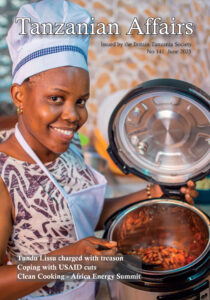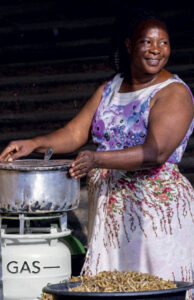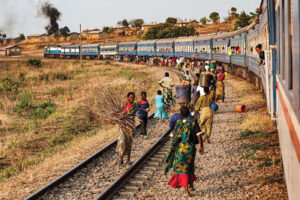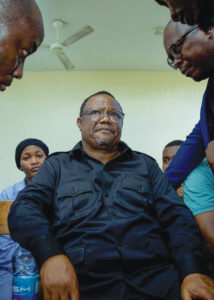
Tundu Lissu during his court appearance in April 2025
Tundu Lissu arrested, charged with treason
On April 9, 2025, Tundu Lissu, the recently elected chairperson of Chadema, the most prominent opposition party, and the party’s most likely 2025 presidential candidate, was arrested in Mbinga, southwest Tanzania. He had been addressing a rally calling for electoral reforms under the slogan “No Reforms, No Election.”
Lissu was charged with treason, a non-bailable offense carrying a potential death penalty, and three counts of “publication of false information” under Tanzania’s cybercrime laws, stemming from a YouTube post on April 3, 2025, alleging police involvement in electoral malpractices ordered by President Samia Suluhu Hassan.
Lissu was transferred to Dar es Salaam and appeared at Kisutu Magistrates Court on April 10, 2025. His treason case was adjourned to April 24, 2025, and he remains in custody, as treason charges do not allow bail.
On April 24, the police used force, including teargas, to disperse Chadema supporters outside the court, injuring at least 14 people. Lissu refused to attend a virtual court hearing, and two Chadema officials, John Heche and John Mnyika, were arrested en route to a join a group of supporters near the courthouse.
In context
On April 12, 2025, the Independent National Elections Commission barred Chadema from participating in the October 2025 elections, citing the party’s refusal to sign an electoral code of conduct, which Chadema views as a tool to suppress opposition. This disqualification severely limits Lissu’s and Chadema’s ability to challenge the ruling Chama Cha Mapinduzi (CCM).
Lissu has consistently called for an electoral commission that is genuinely independent, arguing that the current one, appointed by President Hassan, cannot ensure free and fair elections. His campaign intensified after the November 2024 local elections, where Chadema claimed thousands of its candidates were disqualified, allowing CCM to win almost all the seats contested.
A recent address to party members included a strong reminder of last year’s local government elections where official results gave candidates from the ruling CCM party more than 99% of the grassroots level seats at stake amid widespread claims of electoral fraud. “After going through that experience, any Chadema member who hopes to win in the same circumstances is not serious,” Lissu said. “We will just be slaughtered again, and that’s why we are pushing for reforms across the entire system of conducting the elections to prevent a repeat of that kind of farce.”
In September 2024, a senior Chadema official, Ali Mohamed Kibao, was abducted and killed, and the Tanganyika Law Society has reported 83 abductions or disappearances of government critics. There have also been mass arrests, including over 100 Chadema members (and five journalists) in Mbeya in August 2024, for planning a youth rally.
Lissu is no stranger to political difficulties. In 2017, he survived an assassination attempt, sustaining 16 bullet wounds, which forced him into exile in Belgium until 2020. He ran against President John Magufuli in the 2020 election, which was marred by allegations of rigging, and returned to Tanzania in 2023 after Hassan lifted a ban on rallies.
Some responses
Neither the Home Affairs Minister, Prime Minister nor President Samia Suluhu Hassan have directly addressed Lissu’s April 2025 arrest in public statements available up to May 15, 2025.
President Samia has previously positioned herself as open to dialogue with opposition leaders, though Chadema leaders have questioned how wholehearted these efforts have been. Despite introducing some reforms in 2021-2022, such as lifting bans on opposition rallies, recent signs suggest Hassan is retreating from democratic commitments, with Lissu’s arrest seen as part of a strategy to suppress opposition ahead of the October 2025 elections.
Zitto Kabwe, a leading figure in ACT Wazalendo, Tanzania’s second-largest opposition party, has expressed his concern over Lissu’s arrest. “Tundu Lissu’s case is a test for Tanzania’s democratic credentials under President Samia. How the courts handle it will be closely watched, both locally and internationally.” Unlike Chadema, ACT Wazalendo did (with reservations) sign the electoral code of conduct.
John Heche, the vice-chair of Chadema, defended Lissu’s campaign for electoral reform, invoking Tanzania’s founding president: “Mwalimu Nyerere said that Tanzanian youth should rebel against oppressive systems. What is the problem with rebelling against people who steal elections, against elections being stolen?”
John Mnyika, the party’s secretary general said: “They may silence Lissu for a day, but they cannot silence the will of the people forever.”
The party has also released official statements on the case. “The arrest of the Chairman of Chadema, Tundu Lissu, is a clear signal by the Samia and CCM regime that they do not respect the Constitution of the United Republic of Tanzania that declares Tanzania to be a multiparty democracy.”
Religious leaders in Tanzania have actively commented on Tundu Lissu’s arrest and the broader state of Tanzania’s democracy, expressing alarm over democratic backsliding and human rights violations. On April 20, 2025, the TEC, representing Catholic bishops, issued a statement calling for the immediate and unconditional release of Lissu and other detained political leaders, emphasizing that such actions are essential for preserving national peace ahead of the October 2025 elections.
The European Parliament and Amnesty International have called for Lissu’s immediate release, condemning his arrest as politically motivated and urging Tanzania to uphold freedom of expression and assembly. On May 8, the EU Parliament passed a resolution condemning Lissu’s arrest and expressing “grave concern over the charges against him, which appear to be politically motivated and carry the risk of capital punishment.” It called for his “immediate and unconditional release,” ensuring his safety and right to a fair trial and legal representation. The resolution also urged Tanzania to respect democratic principles and allow opposition parties to operate freely.
A backlash to the backlash?
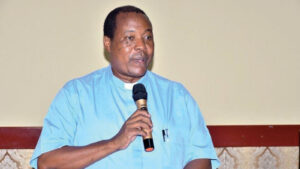
Father Charles Kitima, secretary general of the TEC (Tanzania Episcopal Conference), who was attacked in April
Father Charles Kitima, secretary general of the TEC and a longstanding critic of human rights abuses, was attacked on April 30, 2025 at the TEC headquarters in Kurasini, Dar es Salaam, by unknown assailants. It has been widely alleged that this was in retaliation for his outspoken stance. He had criticised the government’s actions, including Lissu’s detention, as “unlawful”, and linked Lissu’s arrest to broader electoral malpractices. “Stealing citizens’ votes, introducing fake or invalid ballots, and declaring someone who did not receive the majority of votes, while ignoring the rightful winner, that is evil, and it is the work of the devil.”
In a social media video recorded just hours before he was attacked, Kitima criticized “lawlessness” in Tanzania’s political system, urging the government to address electoral injustices to ensure free and fair polls. Following his attack, he relayed a message urging Tanzanians to “stand firm in defending fundamental national issues” and “not be afraid to pay the price for upholding justice and our national responsibilities.”
Opposition leaders condemned the attack, including Chadema’s John Heche who described it as “bad news for the country” and ACT Wazalendo’s Dorothy Semu who said it was “shocking and disturbing”. She questioned whether an ordinary person would attack a prominent religious leader in such a public location.
The government has not directly responded to Kitima’s specific comments on Lissu or electoral reforms, nor has it issued an official comment on the attack on Fr Kitima. However, both President Samia Suluhu Hassan and the Prime Minister Kassim Majaliwa had recently warned religious leaders against using their platforms for political purposes. Just in April, Mr Majaliwa urged religious leaders to focus on moral issues like gender-based violence rather than political matters.
On May 2nd, the EU delegation in Tanzania expressed being “deeply saddened” by the attack, and the US Embassy issued a statement condemning the “shocking and brutal attack.” The EU described Kitima as a “respected voice for civic education, inter-faith dialogue, and a peaceful, inclusive society.” They echoed calls for a “thorough investigation” and wished for Kitima’s speedy recovery, emphasizing his role in promoting democratic values.
Looking to the election
The next issue of Tanzanian Affairs is due out in October, around the time of the next elections. In the meantime, the situation is more than usually tense.
Chadema’s decision effectively to boycott the election means that one of the major players in Tanzanian politics will be sitting on the sidelines. It has also introduced some intra-opposition tension, as the other major opposition party – ACT Wazalendo – with a big presence in Zanzibar has not joined the boycott.
Both decisions are understandable. ACT’s major focus is Zanzibar, where the previous experience of CUF election boycotts has been that this has been ineffective and results only in a party being entirely locked out of power for five years. Party leader, Zitto Kabwe wrote recently that “to boycott these elections would be to hand victory to those who thrive on our silence. Instead, we fight, inspired by warriors of change who turned rigged elections into battlegrounds for justice. And that we will surely do!”
For Chadema, they highlight a situation where two key “referees” – the registrar of political parties and the electoral commission – are far from independent and ask how a meaningful election is possible in such circumstances. The “election code of conduct” appeared to be the immediate cause of their decision not to participate, and the party claims the code was a tool to suppress opposition. Nevertheless, their slogan “no reforms, no election” makes it clear that without significant electoral and/or constitutional reform, they were never likely to make a different choice.
With Chadema sitting things out, CCM faces little opposition. The only other party of significance is ACT-Wazalendo, which lacks Chadema’s organisational strength (with the exception of Zanzibar).
Voter turnout, which fell from 67% in 2015 to 52% in 2020, may fall even further, reflecting growing number who question the point of voting.
Electoral reform, particularly the establishment of a truly independent electoral commission, has been a central demand of opposition parties, civil society, and religious leaders. However, there are no prospects for meaningful reform before October 2025. In February 2024, Parliament passed amendments including the National Electoral Commission Act adding “Independent” to the name of the National Electoral Commission (NEC), making it “INEC” and shifting appointments to a panel chaired by the chief justice. However, these changes have been widely criticised as cosmetic, as the president retains veto power over appointees, and returning officers remain presidential appointees.
In September 2023, the President cited “insufficient time” for constitutional reform before the 2024 local elections, a stance that logically extends to 2025. This was despite a 2022 government task force recommending an independent electoral body and constitutional review. The government’s introduction of bills effectively maintaining the status quo as well as its response to Chadema’s “no reform, no election” campaign, have made it clear that the government has no inclination for change.
President Samia’s initial reforms (initiating cross-party dialogue, lifting rally bans in 2023, etc.) raised hopes for a democratic revival. However, more recent actions, including appointing Magufuli loyalists like Paul Makonda (see Issue 139), the arrest of Lissu and a growing number of apparent disappearances of critics strongly suggest a return to a hardline approach.
Neither domestic advocacy nor international pressure has shifted CCM’s stance, and the party’s ongoing dominance suggests that the official election results are not difficult to forecast. Given the high state of tension, however, as well as widespread anger among opposition party supporters, the broader outcome of the election is much more open. Chadema supporters in particular will have no obvious outlet for their frustrations. Protests and rallies are likely, to which the police response is highly predictable.
